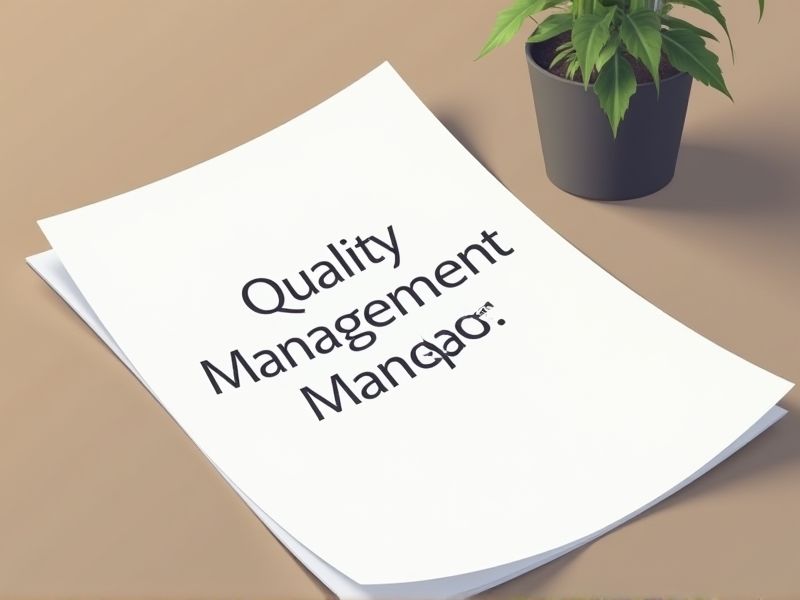
Quality Management System Managers play a crucial role in ensuring that organizational processes meet high standards of quality, which directly impacts customer satisfaction and regulatory compliance. Certifications provide managers with the up-to-date knowledge and skills necessary to implement effective quality management strategies. They also validate a manager's expertise and competency to stakeholders, reinforcing trust and credibility within an organization. A few key certifications can significantly enhance a Quality Management System Manager's capability and employability.
ISO 9001 Lead Auditor Certification
Quality Management System Managers with ISO 9001 Lead Auditor Certification can efficiently evaluate and ensure compliance with international quality standards. The certification equips them with the skills necessary to identify improvement areas and implement effective quality management practices. Holding this certification enhances an organization's credibility by demonstrating a commitment to maintaining high-quality standards. Organizations benefit from reduced errors and enhanced customer satisfaction as certified managers lead systematic auditing and continuous improvement efforts.
Certified Manager of Quality/Organizational Excellence (CMQ/OE)
The CMQ/OE certification provides quality management system managers with formal recognition of their expertise and skills, enhancing career advancement opportunities. Possessing this certification often leads to improved organizational efficiency, as certified managers are equipped to implement best practices and continuous improvement strategies. The certification ensures that managers are knowledgeable in cost and risk management, crucial for maintaining and elevating quality standards. It also signifies a commitment to ongoing professional development, ensuring managers are up-to-date with the latest quality management trends and methodologies.
Certified Quality Auditor (CQA)
Certified Quality Auditors (CQA) enhance a Quality Management System Manager's ability to ensure compliance with industry standards, leading to improved quality control. The certification equips managers with the skills to identify inefficiencies, fostering a culture of continuous improvement within the organization. With CQA knowledge, managers can conduct comprehensive audits, reducing the risk of defects and promoting customer satisfaction. Having CQAs within the team can facilitate better communication between departments, streamlining processes and aligning them with organizational goals.
Certified Quality Engineer (CQE)
A Certified Quality Engineer (CQE) enhances a Quality Management System Manager's ability to analyze and improve processes due to their deep understanding of statistical methods and quality tools. With CQE certification, the manager can effectively identify areas of waste and variation, aligning operations more closely with organizational goals. The certification provides the manager with the skills to implement systematic problem-solving approaches, improving product and service quality. This background ensures compliance with international standards, fostering trust with stakeholders and customers.
Six Sigma Black Belt Certification
Achieving a Six Sigma Black Belt Certification equips quality management system managers with the methodology and tools to efficiently identify and eliminate defects in processes. This certification signifies a deeper understanding of statistical analysis, which is essential for improving process performance and ensuring product quality. The structured approach of Six Sigma enhances decision-making skills, leading to more precise and impactful process improvements. Consequently, possessing this certification often results in better project outcomes and increased customer satisfaction, aligning with organizational goals for quality excellence.
Lean Six Sigma Green Belt Certification
Achieving Lean Six Sigma Green Belt Certification equips a Quality Management System Manager with advanced skills in process improvement and waste reduction, which enhances operational efficiency. Mastery of data analysis tools and techniques in this certification enables more informed decision-making and problem-solving within quality management systems. The certification fosters a systematic approach to identifying and eliminating inefficiencies, leading to consistent product quality and customer satisfaction. It also signals to stakeholders a commitment to maintaining high standards, providing a competitive edge in industry practices.
Certified Quality Improvement Associate (CQIA)
A Certified Quality Improvement Associate (CQIA) enhances a Quality Management System Manager's ability to apply basic quality tools and techniques effectively. Possessing a CQIA certification demonstrates a comprehensive understanding of quality improvement processes, aligning with organizational goals. It equips managers with essential knowledge to facilitate team-based continuous improvement initiatives. This certification cultivates a foundational skill set that bolsters the manager's competence in maintaining and upgrading quality management systems.
ISO 13485 Lead Auditor Certification
ISO 13485 Lead Auditor Certification is crucial for a Quality Management System Manager because it ensures a comprehensive understanding of medical device industry regulatory requirements. Addressing these standards is essential for maintaining compliance and preventing regulatory fines or product recalls. Certification equips managers with the skills to conduct effective internal and supplier audits, identifying gaps in process efficiencies. Enhanced audit capabilities lead to improved risk management, fostering customer confidence and ensuring product safety and quality.
Project Management Professional (PMP)
The Project Management Professional (PMP) certification equips a Quality Management System Manager with advanced project management skills, which leads to more efficient processes and successful project execution. When a Quality Management System Manager holds a PMP, it signals their ability to align projects with organizational goals, enhancing overall quality outcomes. The structured methodologies taught in PMP courses enhance risk management skills, reducing project delays and quality issues. The certification demonstrates a commitment to continuous improvement, which fosters an environment of quality excellence within the organization.
Risk Management Professional (RMP)
Risk Management Professionals assess potential risks that could disrupt a Quality Management System, ensuring that potential quality failures are mitigated. Their expertise guides organizations in identifying, analyzing, and prioritizing these risks, leading to more robust quality outcomes. By integrating risk management, Quality Management System Managers can enhance compliance with standards, such as ISO 9001, which emphasizes a risk-based approach. Furthermore, RMPs help in crafting contingency plans that safeguard the integrity and reliability of quality processes under unforeseen circumstances.
Summary
You gain enhanced credibility within your industry when you, as a Quality Management System Manager, obtain certifications. Customers and stakeholders tend to trust certified professionals more, thus potentially increasing business opportunities. Certified managers often instigate improved operational efficiency, leading to reduced errors and costs. Certification can also elevate your career prospects and open doors to leadership roles.
